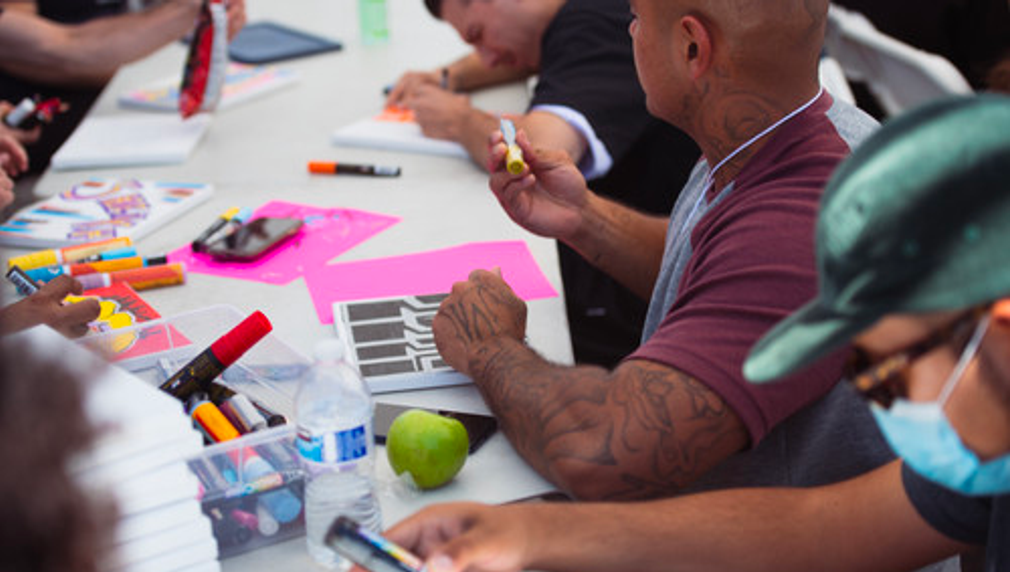Lifting Up Youth Leaders Through Art
Through our Youth Leadership Development (YLD) program, the Arts for Healing and Justice Network (AHJN) supports justice-impacted and at-promise youth in LA County using healing-informed arts education. We offer weekly peer support for youth returning home from incarceration, paid internships with arts organizations, and fellowships helping those most impacted by the juvenile justice system advocate for change. We transform harmful youth narratives by uplifting youth as creators, changemakers, and leaders.

What is the primary issue area that your application will impact?
Support for Foster and Systems-Impacted Youth
In which areas of Los Angeles will you be directly working?
County of Los Angeles
In what stage of innovation is this project, program, or initiative?
Expand existing project, program, or initiative
What is your understanding of the issue that you are seeking to address?
AHJN provides support for justice system-impacted youth, as well as those not directly impacted by the juvenile justice system but who have experienced harm by other systems like the foster care system and the education system. These are young people who need support and healing more than most. YLD youth overwhelmingly attend or have attended schools that are underfunded and underperforming. Most have experienced incarceration, which often (re)ignites youth trauma, and contributes to a disproportionately high rate of mental disorders. Research shows arts engagement can lead to increased school performance, social emotional development, the development of self-efficacy skills, and physical and mental health benefits. In YLD, youth access high quality, healing-informed arts programming, leadership development, mentorship, skill-building, and other resources. They can leverage the power of their voices to change the trajectory of their lives — and of the juvenile justice system.
Describe the project, program, or initiative this grant will support to address the issue.
Through YLD, AHJN centers youth voices, provides healing and support, and guides system-impacted and at-promise youth as they become leaders and advocates. Our approach is youth-centered, culturally responsive and healing-informed. YLD includes three components: the Our True Colors (OTC) weekly peer support group, a Justice Intensive fellowship track focused on youth-led advocacy, and an Art Fellowship track where youth engage as paid interns with an AHJN member. OTC is designed to support young people in their transition from life within facilities back into the community. It includes field trips, art-making, and life skills classes to help youth readjust to living in their communities. Youth stay connected with OTC after they enter another YLD track, to ensure ongoing peer support. Art Fellowships introduce youth to careers in the arts and help them build skills that can help them succeed. Youth gain access to paid arts-based internships with AHJN member organizations, while also receiving weekly support and mentorship. Working artists do performances, guest workshops, and Q&As to expose youth to the arts as a career path. The Justice Intensive track of YLD offers youth paid advocacy-based fellowships. Here, youth learn to engage in political activism and advocate for healing-informed art, through healing-informed art. They also attend public events and meetings to offer public comment, provide concrete input, and center the voices of those with lived experience.
Describe how Los Angeles County will be different if your work is successful.
Through high-quality arts education, we aim to enhance the lives of system-impacted and at-promise youth in LA County. Youth have a creative, engaging place to go immediately upon return to the community and be referred to a wrap-around agency to support basic needs. YLD programming supports youth returning to their communities and helps build them into leaders. OTC youth have the opportunity to continue on to an Art Fellowship with an AHJN member organization to learn from working artists while being exposed to lesser-known careers in the arts, such as set designer or recording engineer. This experience can change the trajectory of their lives. AHJN seeks to effect change through youth-supporting and youth-led advocacy. Youth in our Justice Intensive actively participate in county-wide meetings that shape practice and policies of public agencies and influence the future for both youth directly served and the broader population of justice-impacted and at-promise youth in LA County.
What evidence do you have that this project, program, or initiative is or will be successful, and how will you define and measure success?
AHJN measures program effectiveness by tracking the number of youths actively participating in and completing programming, legislative action advanced, and improvements in social-emotional wellbeing. A central feature of AHJN is that the youth we serve share input in all levels of our work — from feedback on program design, to advocating for policies and practices that are more inclusive, to helping re-design our evaluation surveys. These intentional practices have resulted in a strengths-based survey of youths’ sense of social connection, access to resources, and sense of mastery (of skills, or overcoming a previous hurdle). Students often engage with arts in ways that reveal important insights about the conditions that led to their incarceration. Youth in our YLD have expressed creativity, shared their voices, built confidence, and started to heal. Since YLD’s inception, we have helped lift up 80 youth in LA County through healing-informed arts education.
Approximately how many people will be impacted by this project, program, or initiative?
Direct Impact: 35
Indirect Impact: 350